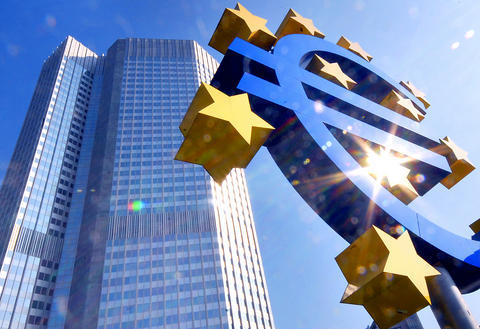The high-flying euro, which last week soared from record to record against the dollar, has sparked sharply contrasting reactions in France and Germany, with Paris complaining and Berlin applauding.
The single currency, shared by 11 other European nations besides France and Germany, shot to a new all-time high of one euro to US$1.4263 on Friday.
While French President Nicolas Sarkozy has made no secret of his distress at the euro's upward trajectory, which tends to punish French exporters, his German counterparts remain serene.

PHOTO: AP
Germany "prefers a strong euro to a weak euro," a spokesman for the German Finance Ministry said last week.
A rising, healthy euro, tending to exert downward pressure on prices of imported products, acts as a shield against inflation, notably by mitigating the effects of steeper oil prices.
A strong euro can however dampen eurozone exports, making goods more expensive and therefore less attractive to foreign buyers. But Germany has so far been largely spared such ill effects, notably as it specializes in high-quality capital goods that are less susceptible to competitive pressures.
Some economists argue the trend in the euro-dollar relationship will stimulate domestic consumer demand and help restore a balance to eurozone economic momentum, which until now has been heavily dependent on exports.
"I wouldn't go as far as saying [the strong euro] is a good thing because export growth has been very supportive of the economy and good for the economic recovery," analyst Jennifer McKeown of Capital Economics said.
"That said, we are hoping for some rebalancing, hoping that consumer growth is going to pick up," she said.
McKeown said France had a "structural" problem that Germany appeared to have overcome, leaving it less vulnerable to the negative impact of a strong currency.
The French "haven't been able to hold back their costs the way the Germans have, when labor costs went through a long period of falling outright and which made them able to maintain their competitiveness," she said.
At Dutch bank ABN Amro, Dario Perkins said that "the impact of the recent rise in the euro probably isn't as great as Mr Sarkozy fears."
While the euro has gained almost 12 percent on the dollar in the past year, what really counts is its performance against a basket of other representative currencies.
"It is the real trade-weighted index that matters for the euro area economy. On this measure, the euro isn't particularly high by historical comparisons. It has increased by only 4.0-5.0 percent since the start of 2006," Perkins said.
He said that the "euro strength suggests global investors are becoming more optimistic about the region's long-term prospects."
"What the Germans are getting at, and it's a point made also by the European Central Bank president [Jean-Claude Trichet], is that the strength of the euro is a reflection of the strength of the economy," McKeown said.

MORE VISITORS: The Tourism Administration said that it is seeing positive prospects in its efforts to expand the tourism market in North America and Europe Taiwan has been ranked as the cheapest place in the world to travel to this year, based on a list recommended by NerdWallet. The San Francisco-based personal finance company said that Taiwan topped the list of 16 nations it chose for budget travelers because US tourists do not need visas and travelers can easily have a good meal for less than US$10. A bus ride in Taipei costs just under US$0.50, while subway rides start at US$0.60, the firm said, adding that public transportation in Taiwan is easy to navigate. The firm also called Taiwan a “food lover’s paradise,” citing inexpensive breakfast stalls

TRADE: A mandatory declaration of origin for manufactured goods bound for the US is to take effect on May 7 to block China from exploiting Taiwan’s trade channels All products manufactured in Taiwan and exported to the US must include a signed declaration of origin starting on May 7, the Bureau of Foreign Trade announced yesterday. US President Donald Trump on April 2 imposed a 32 percent tariff on imports from Taiwan, but one week later announced a 90-day pause on its implementation. However, a universal 10 percent tariff was immediately applied to most imports from around the world. On April 12, the Trump administration further exempted computers, smartphones and semiconductors from the new tariffs. In response, President William Lai’s (賴清德) administration has introduced a series of countermeasures to support affected

CROSS-STRAIT: The vast majority of Taiwanese support maintaining the ‘status quo,’ while concern is rising about Beijing’s influence operations More than eight out of 10 Taiwanese reject Beijing’s “one country, two systems” framework for cross-strait relations, according to a survey released by the Mainland Affairs Council (MAC) on Thursday. The MAC’s latest quarterly survey found that 84.4 percent of respondents opposed Beijing’s “one country, two systems” formula for handling cross-strait relations — a figure consistent with past polling. Over the past three years, opposition to the framework has remained high, ranging from a low of 83.6 percent in April 2023 to a peak of 89.6 percent in April last year. In the most recent poll, 82.5 percent also rejected China’s

PLUGGING HOLES: The amendments would bring the legislation in line with systems found in other countries such as Japan and the US, Legislator Chen Kuan-ting said Democratic Progressive Party (DPP) Legislator Chen Kuan-ting (陳冠廷) has proposed amending national security legislation amid a spate of espionage cases. Potential gaps in security vetting procedures for personnel with access to sensitive information prompted him to propose the amendments, which would introduce changes to Article 14 of the Classified National Security Information Protection Act (國家機密保護法), Chen said yesterday. The proposal, which aims to enhance interagency vetting procedures and reduce the risk of classified information leaks, would establish a comprehensive security clearance system in Taiwan, he said. The amendment would require character and loyalty checks for civil servants and intelligence personnel prior to